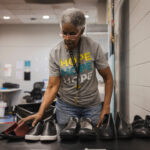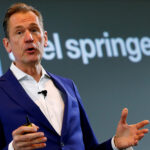College has become a new battleground in the culture wars, and it’s affecting where students enroll and what they’re learning.
Divisive protests, police crackdowns, and a chilling backlash against free speech are among the reasons that a growing number of students say they don’t feel welcome on some college campuses.
In this election year, we talk about the politics of higher education, how it affects you and how to pick a college where you’ll feel welcome.
Conflicts over abortion, LGBTQ+ rights, and DEI, as well as what can and can’t be taught in classrooms, are stirring up campus life.
A majority of students say abortion laws and restrictions around the discussion of race and gender would have at least some effect on where they go to college, according to a Gallup survey.
It and other polls also find that some students at four-year universities feel as if they don’t belong or disrespected.
Students on the left and right alike say they’re increasingly reluctant to express controversial opinions, but that it’s okay to report on classmates or faculty who do.
Hear more about this, against the backdrop of a contentious presidential election.
Listen to the whole series
TRANSCRIPT
Scroll to the end of this transcript to find out more about these topics.
Sound of promotional video: Congrats. Congrats. Congrats on getting into UC Davis! … Welcome to the friendliest. college campus!
Jon: This is a promotional video welcoming students to the University of California, Davis.
Sound of violent protest
Kirk: And this is how welcoming the campus actually sounded when a conservative student group hosted a speaker who opposed abortion and disputed that there’s systemic racism in America.
Jon: Protesters on one side said the speaker shouldn’t have been allowed to share his views at all. People on the other side wanted to hear him out. The event was canceled.
Kirk: Welcome to college in America right now.
Jon: More precisely, this is how unwelcoming college has become. Students and their parents say the breakdown of civility is affecting how they choose a school. And it’s gotten worse with the crackdowns on LGBTQ and reproductive rights and the conflict in Gaza. And we haven’t even discussed the looming presidential election.
David Strauss is a partner in a consulting firm that conducted a survey about this.
David Strauss: One out of four students told us that they had actually ruled out specific schools exclusively because of political considerations, and that proportion was basically equal whether a liberal student, a moderate student, or a conservative one.
Kirk: So how do students and their families choose a college where they’ll feel they belong, where their views will be respected even by people who might disagree with them. Where they’ll hear both sides of an argument without someone trying to shut it down?
This is College Uncovered from GBH News and The Hechinger Report, a podcast pulling back the Ivy to reveal how colleges really work.
I’m Kirk Carapezza with GBH News
Jon: And I’m Jon Marcus at The Hechinger Report. Colleges don’t want you to know how they operate. So GBH …
Kirk: … in collaboration with The Hechinger Report, is here to show you. In this election season, we’ll be exploring how deeply politicized higher education has become and what students and their parents can do to navigate these increasingly treacherous waters.
Today on the show: “Unwelcome to College.”
Jon: So, Kirk, students used to pick a college based on its academic reputation and its social life.
Kirk: Yeah, but the campus quad has become a battlefield in the culture war.
Jon: There are assaults on speech and speakers from the left and the right, messy protests, new restrictions on abortion and LGBTQ rights, attacks on diversity and complaints about excessive wokeness.
Kirk: Yeah. And for us as journalists, these conflicts have been hard to watch. But on a more human level, they’re affecting how welcome students from all backgrounds and points of view feel at many colleges and universities.
Jon: And how they pick a school.
Lee Dunn: I want my child to be in a place that’s safe, that has a diversity of viewpoints and opinions, but doesn’t have, a situation that could feel unsafe, or where someone’s not open to my child being able to have an open debate.
Kirk: That’s Lee Dunn. She’s the mother of a college-bound student, and I spoke with her at a Republican political rally. But she’s expressing a concern that extends pretty much across the political spectrum right now.
Jon: That’s right, Kirk. Several national surveys show that a growing proportion of students and their families are picking colleges based on whether they’ll feel they belong.
David Strauss: The liberal-leaning students tended to cite an array of issues that were mentioned by most respondents who had ruled out schools — reproductive rights, racial equality, LGBTQ+ restrictions, gun laws. Among the conservative students, it was more general: too Democratic, too liberal in terms of LGBTQ laws, conservative voices not welcome, and then too liberal on abortion and reproductive rights.
Jon: That’s David Strauss again. He’s a partner in an education consulting group called Art & Science Group. And it did a poll that found a quarter of prospective students ruled out a college because of the political environment in the surrounding state.
Strauss says abortion in particular has become a really polarizing issue for students since the Supreme Court decision two years ago allowing broad new state restrictions.
David Strauss: Within a week, I received a call from a president of a client institution who told me that her state had moved very quickly to restrict reproductive rights. She heard from a mother asking, ‘How will you take care of my daughter when she returns to school?” She heard from several students — ‘I’m concerned about coming back.’ And she heard from a couple of prospective students saying, ‘I’m no longer coming.’ That phenomenon is probably playing out on the right as well.
Kirk: And that’s just one issue, Jon. There are so many others.
For example, since policies around diversity and equity started coming under attack, Black students are increasingly choosing to go to historically Black colleges where enrollments are up. And a national gay advocacy organization says young LGBTQ students who have been harassed are twice as likely to say they don’t plan to go to college at all. Lawmakers in several states have proposed more than 500 anti LGBTQ laws in recent years.
Jon: Alyse Levine is a private college counselor in North Carolina, where she owns a company called Premium Prep. And she’s been seeing this a lot.
Alyse Levine: We definitely have had students consider these policy changes, as well as just, like, the vibe of what they hear about on these campuses and who feels welcome and who feels like they can speak and who can’t speak. So I can think of a few LGBTQ students in particular, some transgender students who were feeling really uneasy and eliminating some schools because of their elimination of DEI policies. I would say we have an outspoken parent body, too. So it’s not just the students, it’s also parents drawing some lines of where they feel comfortable sending their students and where they feel comfortable sending their money.
Jon: All kinds of students are experiencing this. Gallup finds that more than one in 10 students feel as if they don’t belong on campus. Even more than that reported feeling disrespected or unsafe, or they don’t think they can express their opinions freely.
That’s one of the reasons Angela Amankwaah chose to enroll in an historically Black college, or HBCU — North Carolina Central University — where she’s a sophomore this fall. She’s a Black student from Denver.
Angela Amankwaah: The political landscape really emphasized for me the importance of going to an HBCU, because I knew that I would be in a community of safe, welcoming both professors [and] peers, and just an institution that actually wanted me there.
Jon: She says she’s felt welcome at the school compared to what she would expect to experience these days at a predominantly white institution.
Angela Amankwaah: There’s not a single class where I’m the only Black student, or I’m the only Black woman. Like, there’s just Black students all around me. There’s nothing that I can do in terms of, like, my speech, the way I dress, or even things that happen on or off campus that are strange to other students.
Jon: Javier Gomez left his home state of Florida after it restricted discussion in schools about sexual orientation. He went to college in New York instead.
Javier Gomez: With the Don’t-Say-Gay bill that happened in 2022 and then expanded into higher education — I mean, some of those things make me feel unsafe as a student in the South. These policies are making it harder for us to speak our minds and also feel safe in our communities and in our schools. And I definitely felt unsafe because of the Florida policies have been implemented. It’s not easy, especially specifically being a queer and Latino and first-generation student. So it’s definitely been a hassle.
Kirk: And now, since the conflict in Gaza, Jewish and Muslim students are reporting that they feel more uncomfortable on campus. Here’s college counselor Alyse Levine again.
Alyse Levine: The biggest issue amongst our population this year was the rise in anti-semitism. And there was lots of hesitation among our students based on what was happening on particular campuses.
Kirk: Maya Makarovskisays she heard chants she characterized as anti-semitic at MIT, where she’s a senior this year. She says fellow Jewish students are dropping out.
Maya Makarovski: I know so many people that have taken semesters off or that are leaving MIT. And they’re, you know, grad students or postdocs, so they’re not going to go to another place. They’re just going to leave. It’s really heartbreaking. And I’ve seen it myself. You know, this semester and last semester, my academic performance and focus has just been completely shifted. It’s so difficult to maintain.
Kirk: Surveys find conservative students feel especially unwelcome, and it’s liberal students who are much more likely to believe it’s okay to shut down a speaker who has opinions they don’t like, or report a professor or a fellow student for saying something they think is offensive.
Here are a few more of the people I met at that Republican political rally: student Hayley Ebert and parents John DeMeritt and Jennifer Piacentini.
Hayley Ebert: I didn’t want to take classes that I inherently disagreed with politically.
John DeMeritt: It’s really something, as a parent, that you have to be mindful of. The people who claim to be the most tolerant are the least tolerant of anyone who doesn’t agree with their political views. If you’re not the right skin color or the right gender, all of this stuff plays into even admissions.
Jennifer Piacentini: I don’t want them going to a small liberal school where it’s going to be all picketing and riots.
Jon: Now, let’s put all this into context. Like a lot of political discussions these days, there’s a lot of heat. But part of what we do on this podcast is try to also bring some light.
Colleges are really easy targets. They’re often accused of indoctrinating students into being woke leftists. But 18-year-olds already hold very liberal views. You remember being 18, right, Kirk?
Kirk: It’s like it was yesterday.
Jon: There’s a national survey from UCLA of incoming freshmen, and it finds that twice as many identify with the left as with the right. That’s before they ever set foot in a classroom. And even that Art & Science survey found that while politics might be affecting where students go to college, it’s not actually stopping them from going to college in the first place.
David Strauss: It’s a striking observation you’re making, Jon. Given the volume of the discourse and the volume of concern we’re hearing from the right that colleges have become places of indoctrinating students, it was striking to us that only 2 percent of students who had told us they had been seriously considering going to a four-year institution, but had now decided not to do so — only 2 percent of those students told us that political considerations like those I’ve just described were even one of several factors.
Jon: The proportion of conservative high school seniors who said they decided to not go to college for political reasons is a little higher. It’s around 5 percent. But that’s still lower than we might be led to assume.
Kirk: So, okay, with that helpful context, how do you pick a college? How do you know where you’re going to feel like you belong?
Jon: Colleges are all very different. Take it from Stephanie Marken, whose job is to study that as a senior partner at Gallup responsible for its work in higher education.
Stephanie Marken: Some schools do a much better job of actually embracing the diversity of their student body and really making it a productive dialog between students, as opposed to a highly contentious and challenging culture, which is often where those experiences of disrespect set in. When a student actually reports that they went to an institution in which they were exposed to diversity, they’re more likely to say their degree is worth the cost. And that’s diversity in political ideology, party affiliation, religiosity, race, ethnicity — all types of diversity.
Kirk: Of course, every college says it encourages intellectual diversity. But experts say you shouldn’t just rely on what they say or on the website or the campus tour.
Carolyn Pippen: The thing about campus visits is that you really are just getting one perspective a lot of times.
Jon: That’s Carolyn Pippen. She’s a private college counselor with the college counseling company IvyWise.
Carolyn Pippen: So I also encourage students to do some more generalized research. So is there a multicultural center on campus? Is there an LGBTQ resource center on campus? And not just does it exist, but is it any good? Are they really doing things to support those students? Or reaching out to those offices, asking to connect with students who use those resources and getting information that way. There are also, I mean, you can Google college rankings and get a million useless websites, but there are also some really valid, reputable websites that will rank students based on friendliness towards LGBT students or, you know, how welcome do Black students feel on this campus?
Jon: You can find a lot of those sources in The Hechinger Report’s “College Welcome Guide,” which tells you about laws and policies at universities and colleges in every state. We’ll post a link to it on this episode’s landing page, and to other resources.
But to really get a sense of what it’s like on campus, Pippen says, you need to invest some time.
Carolyn Pippen: Attend a class. If there’s an opportunity to stay overnight, stay in a dorm with another student. As much on-campus interaction as you can get, the better. Of course, that’s much more feasible further along in the process, when the schools that you’re looking at are more limited in number. You can’t do that with 30 different colleges.
Jon: North Carolina college counselor Alyse Levine has another piece of advice: Don’t believe everything you read or see on TikTok.
Alyse Levine: I think it is so important not to make sweeping generalizations about schools based on how a particular issue was mishandled. Going deeper means reaching out to a particular department. If it’s a larger university, you can reach out to a faculty member. Ask to sit in on a class and see what the dialog is like. Is there open discussion? Do conservatives feel like in these liberal bubbles they can’t speak their minds?
Kirk: Wherever students end up, Carolyn Pippen says they can usually find their own niche.
Carolyn Pippen: Even if there is sort of an overarching feel, so to speak, to a campus or, you know, there’s one political stance or viewpoint or ideology that’s predominant, that doesn’t mean that there isn’t a community within that campus for them. I always tell students, like, there are theater nerds at MIT. There is a group of students like you on just about every campus. It’s just a matter of finding them.
Jon: The alternative is more polarization and more division, if students only interact with other students just like them. That’s the fear of everyone we talk to, regardless of politics.
John Bitzan directs the right-leaning Challey Institute for Global Innovation and Growth at North Dakota State University.
John Bitzan: You know, as a parent, I mean, I have sent four kids to universities myself. And I think about, well, what do I want students to get out of the experience? Well, one thing I want them to get is I want them to be exposed to different points of view and learn from people that are different from them and learn that not everybody sees the world the same way. And I think those are really an important parts of the college experience for students. I think that we want to teach students how to deal with people who have different points of view than them in the real world. And, again, if we put them in an echo chamber, that’s not going to happen.
Jon: Alyse Levine worries about this, too.
Alyse Levine: I love that college campuses can still be places where there can be discussion and disagreement, and that it’s a safe place to kind of have that, and to learn. I hope our institutions don’t become so polarized like our society has become. It’s scary to think we might be moving in that direction.
Jon: And here’s another twist. Remember Javier Gomez, the student who left Florida after Florida passed the Don’t-Say-Gay Bill? He ended up going back to finish his associate degree.
Javier Gomez: If I’m not there, then that’s one less voice who’s fighting the fight to dismantle these discriminatory policies. So, yes, it may feel unsafe. It may feel uncomfortable. But, as well, your voice is so important. And so that’s why it was important for me to be in Miami and be in the spaces where I was not welcome. Because if I’m not in those spaces, who else is going to be in them?
Kirk: This is College Uncovered, from GBH News and The Hechinger Report. I’m Kirk Carapezza …
Jon: … and I’m Jon Marcus.
We’d love to hear from you. Send us an email to GBHNewsconnect@wgbh.org, or leave us a voicemail at (617) 300-2486. And tell us what you want to know about how colleges really operate.
This episode was produced and written by Kirk Carapazza and Jon Marcus, and it was edited by Jeff Keating.
Meg Woolhouse is supervising editor.
Ellen London is executive producer.
Production assistance from Diane Adame.
Mixing and sound design by David Goodman and Gary Mott.
Theme song and original music by Left Roman out of MIT.
Mei He is our project manager, and head of GBH podcasts is Devin Maverick Robins.
College Uncovered is a production of GBH News and The Hechinger Report and distributed by PRX. It’s made possible by Lumina Foundation.
Thanks so much for listening.
More information about the topics covered in this episode:
The Hechinger Report “College Welcome Guide”
The Art & Science Group survey of how college students pick colleges
Gallup survey of college graduates’ feelings about diversity
The post College Uncovered, Season 3, Episode 1 appeared first on The Hechinger Report.
College has become a new battleground in the culture wars, and it’s affecting where students enroll and what they’re learning. Divisive protests, police crackdowns, and a chilling backlash against free speech are among the reasons that a growing number of students say they don’t feel welcome on some college campuses. In this election year, we
The post College Uncovered, Season 3, Episode 1 appeared first on The Hechinger Report. Higher Education, News, College Uncovered The Hechinger Report







